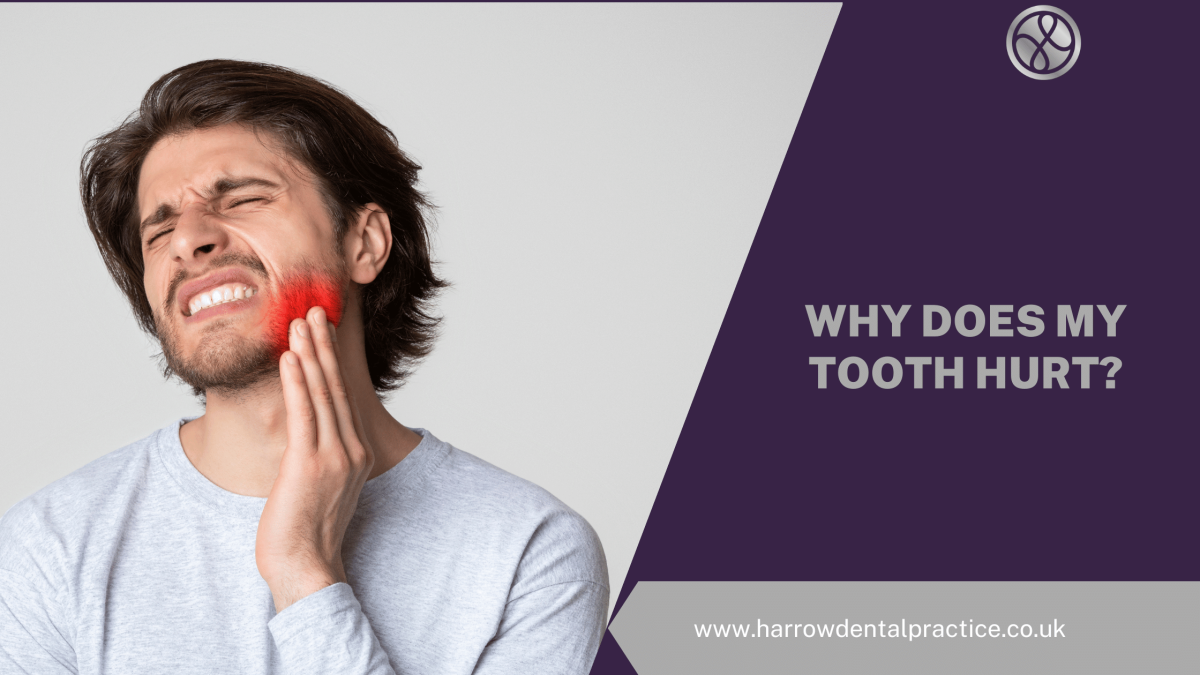Sensitive teeth indicate an underlying issue with one’s oral health and can significantly affect one’s quality of life. If you or a loved one suffers from toothache or sensitivity, you might be wondering about the reason behind it. According to the Oral Health Foundation, over 6 million people in the UK have had a toothache lasting more than 2 weeks. If you’re also searching for an answer to “Why Does My Tooth Hurt?”, then you have come to the right place.
In this blog, we will discuss everything you need to know about dental pain and how to prevent it. So, continue reading to find the answer to your question.
What Can Cause Unexplained Toothache?
Toothache can be caused due to various reasons. One of the most common causes of toothache is dental cavities. A tooth cavity is formed when the enamel, which is the protective outer covering of the teeth, gets damaged due to the toxins released by disease-causing bacteria. Once the enamel is damaged, the nerve endings in the tooth get exposed and cause pain. Another reason for a toothache is an infection or a dental abscess. Some people can also experience a toothache because of inflamed soft tissues around an impacted wisdom tooth. Another reason for having a toothache is due to an object stuck between two teeth.
What Are The Different Types Of Tooth Pain?
According to the Cleveland Clinic, there are different types of tooth pain:
- A dull, persistent pain
- A sharp, stinging type of pain
- Throbbing pain
- Pain caused due to sensitive teeth
- Tooth pain caused by dental infection
- Pain associated with an impacted tooth
Your dentist will perform a detailed clinical examination to determine the underlying cause of the toothache, and then provide appropriate treatment.
Why Do We Suffer From A Toothache When We Have Cavity?
One of the most common symptoms of a dental cavity is pain in the affected tooth. The pain occurs due to the exposure of the nerve endings in the deeper layers of the tooth. As a result, even slight changes in the temperature or pressure in the mouth can trigger pain. Initially, the pain is transient and goes away as soon as the hot or cold stimulus is removed. However, if treatment is not sought timely, it can lead to an infection, causing severe, persistent pain. In such cases, the only treatment option to save the tooth is to perform a root canal treatment procedure.
Can A Crown Tooth Hurt Years Later?
If you’re experiencing pain in one of your teeth supported by a crown, it could be due to secondary tooth decay. This type of tooth decay occurs at the tooth-restorative margin. So, if a tooth was restored with a filling to place a crown over it, the formation of secondary caries around the affected tooth can cause dental pain.
Why Do I Have Throbbing Tooth Pain?
A throbbing pain in one of your teeth may indicate an underlying infection. In case you or a loved one is experiencing severe, throbbing pain in one of their teeth, you should consult your dentist without delay. Your dentist will perform a detailed clinical examination to ascertain the underlying cause and provide appropriate treatment.
What Should I Do If My Toothache Won’t Go Away?
While some types of toothaches can be treated at home, others require immediate intervention and management. For example, you may take an over-the-counter pain medication and see if it helps. You can also try other treatment options. For example, if you have something stuck between your teeth, you can try to remove it using dental floss. However, if it cannot be removed, you should visit your dentist for treatment. Similarly, if you have a dental swelling along with severe pain and high-grade fever, it indicates a medical emergency. Such problems can arise due to a dental abscess or sinus infection, and they should be treated without delay.
In any case, if your pain does not go away despite pain medication or at-home remedies, you should visit your denist without delay.
How To Prevent My Teeth From Hurting?
The best way to prevent your teeth from hurting is to ensure optimal oral hygiene. This prevents plaque and tartar formation, which are the building blocks of various dental problems such as tooth decay and gum disease. More importantly, you should visit your dentist regularly for checkups. This helps identify dental problems in their early stages, so that they can be treated before they can cause significant damage to your oral health.
Do I Need A Root Canal? I Have A Toothache?
A toothache can occur due to various reasons. A root canal is needed when the dental pulp of a tooth gets inflamed irreversibly. In such cases, dentists remove the inflamed pulp from within the tooth’s interior and replace it with an inert material. So, not all types of toothaches require a root canal treatment.
Why Does My Root Canal Hurt After A Year?
It is possible for a root canal-treated tooth to hurt again after a year. This can occur due to re-infection. In such cases, dentists perform the root canal procedure again to remove the remnant inflamed tissue.
If you are looking for the best dentist in Essex for the general dentistry or emergency dental services, your best option is to visit Harrow Dental Practice and Dental Implant Centre. We offer high-quality dental services to our patients under one roof. So, what are you waiting for? Click here to make an enquiry today, and let us take care of the rest.

